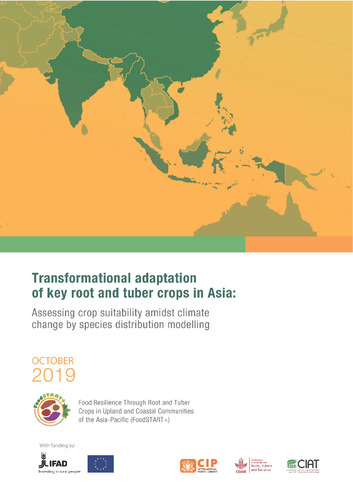Transformational adaptation of key root and tuber crops in Asia using species distribution modelling to assess crop suitability under progressing climate change
Widespread negative impacts of climate change include limited plant growth, decreased soil fertility, and ultimately limited food production (Dhankher et al., 2018). Roots, tubers and bananas (RTB) are key commodities for food security, nutrition and livelihoods especially among small-holder farmers. Furthermore, roots and tubers, being resilient crops, can help farmers adapt to climate change and variability. Nevertheless, food security and livelihood agenda mostly emphasize on grain crops (such as rice, maize, and wheat), and very few studies have looked into the future potential of RTB crops and their likely increasing importance in the face of climate change (Atakos, 2018). This study attempts to identify areas in the Asia-Pacific region where considerable climate impacts that threaten agricultural viability of major crops are expected. The study used climate projections and species distribution modeling approach for eight key crops in the region. In areas where impacts are very high, it is assumed that the currently cultivated crops may need to be substituted with more resilient crops. Key findings of this study include:
• Countries, such as India, China, and Myanmar will experience high impacts of climate change on land suitability for maize.
• Although there is a general decrease of climatic suitability for rice, the viability threshold was not crossed across time periods. However, climate change will put increasing pressure on this crop, particularly in India that will likely experience considerable losses of land suitability for rice.
• Among RTB crops, cassava and sweetpotato can play an important role in terms of food resilience in areas where climate change is likely to trigger transformational changes for non-RTB (rice and maize) and some RTB crops.
• Some RTB crops, although considered resilient crops, will also undergo considerable transformational change, specifically potato in India.
• In terms of food system resilience, considerations and emphasis on the role of cassava and sweetpotato (and RTB in general) should be integrated in any adaptation initiative, especially in countries where food systems and value chains are particularly threatened by climate change.

